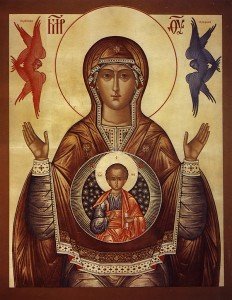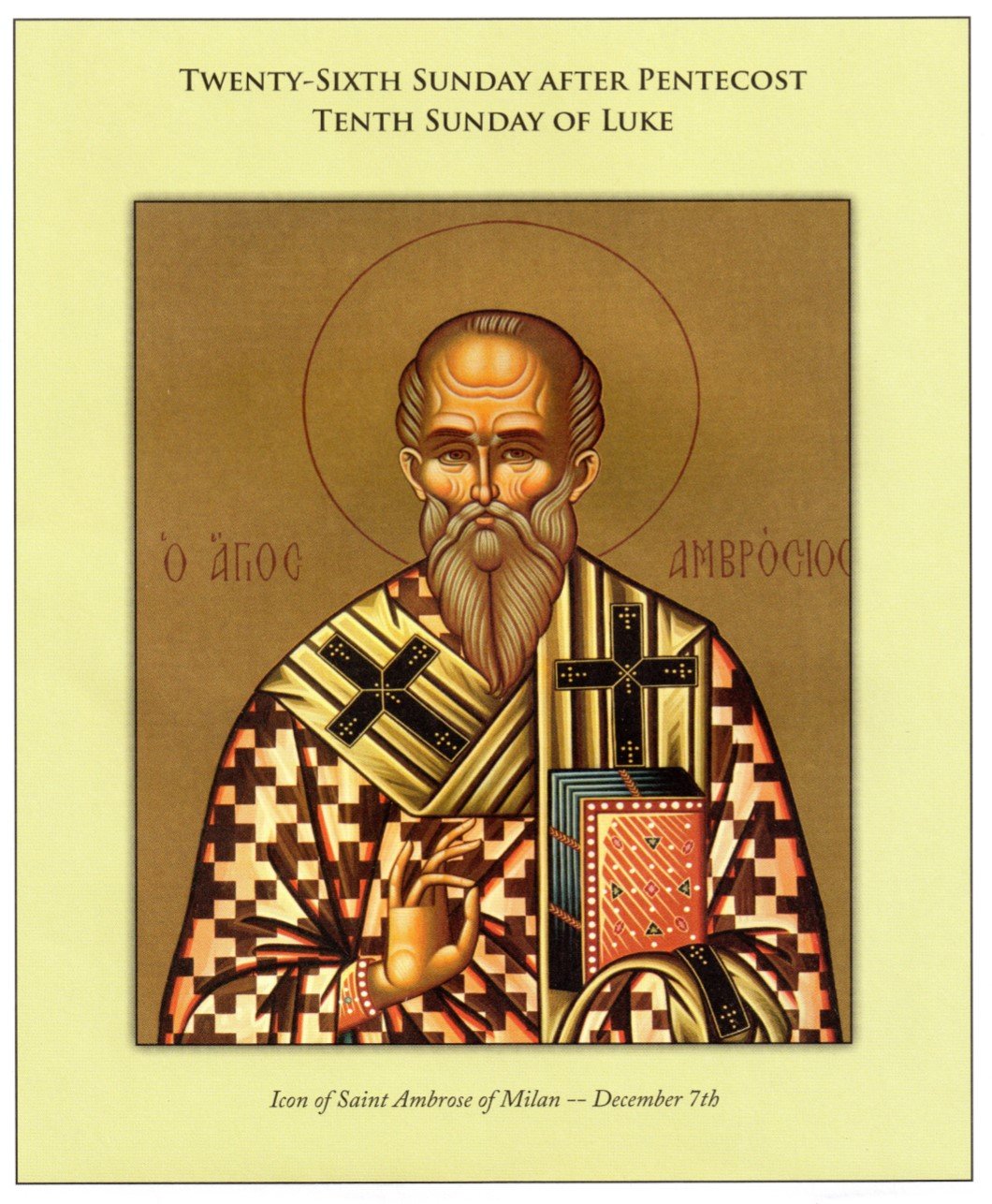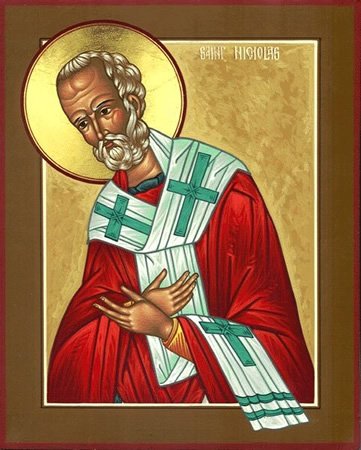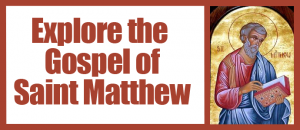Again I ask You, Heavenly Father, to allow me to join my voice with the Church and pray: “Behold the time of our salvation draws near: let the cave be ready, for the Virgin is about to give birth; and you, Bethlehem of Judah, rejoice and be glad for the Lord will soon shine forth from your midst. Listen, all you mountains and you hills, and all you country of Judah: Christ is coming to save us, His creatures, for He is the Lover of mankind”. Help me, Father, to realize that this mystery is happening right now. I ask Your help and offer praise to You, Father, Son and Holy Spirit, now and ever and forever. Amen.
O Holy Father, help me to pray with the Church these holy words: “Heaven give heed; and earth lend your ear! The Son of the Father, the Word Himself is coming! He shall be born of an undefiled maiden. Because she consented and gave birth without pain, through the assistance of the Holy Spirit, make ready Bethlehem; and you, Eden, open your gates; for He who is shall become the Dispenser of great mercy to the world”. Help me, O Holy Father, to understand that the winter feasts we are about to celebrate do not commemorate past events but, rather, celebrate what I believe, and the Church believes, are transpiring at the present time in the spiritual dimension. I ask Your help and offer praise to You, Father, Son and Holy Spirit, now and ever and forever. Amen.
I would invite the members of St. Michael’s Parish to join with me and the members of Holy Ascension in a Christmas Outreach to the First Step Program which helps and supports abused wives and children. I would commend this program to your generosity. Funds will be used to purchase Gift Cards so families can purchase food and gifts.
Heavenly Father, with eagerness help me to join with all people in celebrating, before its time, the Nativity of Christ. Let me lift up my mind and heart to Bethlehem and contemplate the great Mystery in the cave. Eden was opened when God came forth from the pure Virgin, a perfect Man and perfect God. Wherefore, let me cry out and say, “Holy is God the eternal Father! Holy is the Mighty One, the Incarnate Son! Holy is the Immortal One, the Spirit Paraclete! All-Holy Trinity, glory be to You. I ask Your help and offer praise to You, Father, Son and Holy Spirit, now and ever and forever. Amen.
Almighty God, the days go short before the celebration of Your Holy Birth in the Person of Jesus, the Christ. Help me to use these remaining days to prepare my heart and mind to truly celebrate this great feast. Help me to understand that Your birth tells me that You are the life-force within each human being. Help me also to understand that since You are within me, that You are being constantly born again in our world in me. Help me to understand that this gives great purpose and meaning to my life. I am now the person through whom You enter into the world. Like Jesus, it is my purpose to bring Your love and kindness into the world and truly make Your kingdom present. I ask Your help and offer praise to You, Father, Son and Holy Spirit, now and ever and forever. Amen.
 O heavenly Father, I know that today our Church celebrates the conception of the Virgin Mary by Anna and Joachim. This event marked the beginning of Your final revelation to all humankind about Your presence in our lives and world. Help me to keep this day holy as I continue my preparation for the winter feasts. As I think about how Joachim and Anna persevered in their trust in Your loving kindness, help me to never to loose my trust in Your great mercy and love. Help me to know, first of all, that perseverance in my trust in You can only lead to true happiness. Like Joachim and Anna, life presents struggles and challenges to help me know how to trust Your loving kindness. I know that You will never forsake me in the same way that You did not forsake Anna and Joachim. As they spent time preparing for the birth of Mary, help me spend time preparing to for the birth of Jesus, her Son, in my heart and life. I ask Your help and offer praise to You, Father, Son and Holy Spirit, now and ever and forever. Amen.
O heavenly Father, I know that today our Church celebrates the conception of the Virgin Mary by Anna and Joachim. This event marked the beginning of Your final revelation to all humankind about Your presence in our lives and world. Help me to keep this day holy as I continue my preparation for the winter feasts. As I think about how Joachim and Anna persevered in their trust in Your loving kindness, help me to never to loose my trust in Your great mercy and love. Help me to know, first of all, that perseverance in my trust in You can only lead to true happiness. Like Joachim and Anna, life presents struggles and challenges to help me know how to trust Your loving kindness. I know that You will never forsake me in the same way that You did not forsake Anna and Joachim. As they spent time preparing for the birth of Mary, help me spend time preparing to for the birth of Jesus, her Son, in my heart and life. I ask Your help and offer praise to You, Father, Son and Holy Spirit, now and ever and forever. Amen.
O most merciful God, the time is quickly passing before we celebrate the feast of Your Nativity and Your Manifestation as the God-man Jesus. Help me not to allow the preparations for Christmas to distract me from preparing myself spiritually to celebrate these feasts. Help me from getting caught-up in the traditional, hectic pace suggested by society for the celebration of Christmas. I know that if I allow myself to become fully focused on sending cards, buying presents, decorating the house and preparing food, I will forget to prepare myself spiritually for these feasts – I will forget the true meaning of these feasts. I ask Your help and offer praise to You, Father, Son and Holy Spirit, now and ever and forever. Amen.
 The miracle story shared in our Gospel reading today, the curing of the ten lepers, contains, in my mind, three points of interest (1) the story highlights the fact that the lepers sought a cure from Jesus, (2) the lepers were cured only when they heeded the directions that Jesus gave them, and (3) the appropriate response to the cure, namely gratitude, was only made by one man and he was a Samaritan. It is important that we understand this story in the context of Luke’s narrative.
The miracle story shared in our Gospel reading today, the curing of the ten lepers, contains, in my mind, three points of interest (1) the story highlights the fact that the lepers sought a cure from Jesus, (2) the lepers were cured only when they heeded the directions that Jesus gave them, and (3) the appropriate response to the cure, namely gratitude, was only made by one man and he was a Samaritan. It is important that we understand this story in the context of Luke’s narrative.
This story only appears in Luke’s Gospel and is thematically linked with a parable that precedes it. The first parable waves aside gratitude where this present story inculcates it. Both, however, conclude with the necessity of faith.
A number of scholars consider this story of the ten lepers to be a mere parable, a Lucan construction based on a story in Mark’s Gospel (1:40-45) wherein Jesus cures a leper. As a parable does, this story ends with a statement rather than with the wonderment of the onlookers as a miracle story does. Luke, however, has already recorded the Marcan story (5:12-16) and is known not to repeat stories. It is possible that in the process of oral transmission, details of a parable passed over into a miracle story. This story, along with those in chapter eighteen (18:1-8 and 18:9-14) gives the dispositions for prayer: gratitude, perseverance, compunction, humility and contrition.
When you think of the three elements that I pointed out are in this story-parable, you can see that the intention was to help us understand the dispositions we must have as we enter into prayer. Jesus told the lepers to go to the temple and present themselves to the priests and only cured them on the way.
What is again interesting about this story is that only the Samaritan understood that he should be grateful for the gift given to him by Jesus. This again highlights the fact that Jesus was pointing out that the people who should have known that gratitude was an essential part of prayer, seemed to be oblivious to this fact or just didn’t care. The Samaritan, supposedly, didn’t know as much about the faith as the others but he did know to be grateful.
We who say that we follow the teachings of Jesus should know that we must be grateful for the many things that we have in life, even the opportunities that life presents to help us change. It is incumbent upon us to make sure that each day we express our gratitude to God for the life He is giving us, regardless of the challenges facing us. It seems that having a real sense of gratitude for the life we have brings about interior healing and peace. Let us say: O Lord, with awe I give thanks to You for Your loving kindness and for all the benefits You have poured so abundantly upon me!
 St. Nicholas of Myra is truly one of the most popular saints of our Church. Tradition maintains that he was born to well-to-do parents in the province of Lycia in the southern part of Asia Minor in the city of Patara. The precise date of his birth is unknown. Having inherited his parents’ estate, he became known for his generous gifts to those in need. As a youth, he made pilgrimages to Palestine and Egypt.
St. Nicholas of Myra is truly one of the most popular saints of our Church. Tradition maintains that he was born to well-to-do parents in the province of Lycia in the southern part of Asia Minor in the city of Patara. The precise date of his birth is unknown. Having inherited his parents’ estate, he became known for his generous gifts to those in need. As a youth, he made pilgrimages to Palestine and Egypt.
He is known to have been archbishop of Myra and he may have participated in the Council of Nicea in 325, even though his name does not appear on any of the documents from that Council. Little else is known about where he studied to become a priest or who even consecrated him.
Tradition tells us that he was imprisoned during the persecutions of Diocletian and released by Emperor Constantine. Nicholas was noted for his defense of the true faith against the Arians. He died in Myra on December 6th in a year uncertain, but between 342 and 352.
Many of the details of his life that we have appeared during medieval times. St. Methodius, Patriarch of Constantinople, in the middle of the ninth century, produced a life of Nicholas in which he noted that the life of Nicholas was unknown to most of the Christians of the time, thus indicating his composition was probably based mainly on legend. Methodius noted that Nicholas was raised well by pious and well-to-do parents and related how Nicholas contributed from his inheritance the dowry for three daughters of a citizen of Patara who had lost all his money.
His feast was celebrated by the time of St. Justinian, two centuries after his death. After Methodius’ life of Nicholas became available, Nicholas was acclaimed and honored throughout Europe and especially in Italy. When Myra was captured by the Saracens in 1034, many Italian cities planned to “rescue” his relics. In 1087, forces from Bari, Italy, attacked Myra and carried away his relics from the town of Myra to Bari where they were and are enshrined in a church. His fame increased. The story of his rescue of sailors in the Aegean Sea during his lifetime established him as the patron of mariners.
The sainthood of St. Nicholas’ pre-dates considerably the 1054 schism between the Eastern and Western churches. Although the 1969 revision of the Roman Catholic calendar has made his feast optional, his feast is maintained in the Eastern Church by both Catholic and Orthodox Christians.
As all are aware, our own Eparchy and Cathedral Church have St. Nicholas as a patron. By tradition, gifts were always given to loved ones, especially children, on the feast of St. Nicholas instead of on the feast of Christmas.
 In Matthew’s Gospel, Jesus restricts His mission during His lifetime to Jews. When He gives His disciples mission instructions, He tells them: Go nowhere among the Gentiles, and enter no town of the Samaritans, but go rather to the lost sheep of the house of Israel. Later he says about Himself: I was sent only to the lost sheep of the house of Israel. It is only the risen Jesus, the post-Easter Jesus, in the last verse of the gospel, who commissions His followers to go to the nations, that is the Gentiles.
In Matthew’s Gospel, Jesus restricts His mission during His lifetime to Jews. When He gives His disciples mission instructions, He tells them: Go nowhere among the Gentiles, and enter no town of the Samaritans, but go rather to the lost sheep of the house of Israel. Later he says about Himself: I was sent only to the lost sheep of the house of Israel. It is only the risen Jesus, the post-Easter Jesus, in the last verse of the gospel, who commissions His followers to go to the nations, that is the Gentiles.
This being said, it is good to note that Matthew seems to be deeply hostile toward Jews – meaning those who opposed Jesus or at least did not respond to Him. Of course, the other gospels also report conflict between Jesus and some of His Jewish contemporaries, including groups like scribes, lawyers, Pharisees, Sadducees and temple authorities. But Matthew intensifies it. His language is harsher and more intemperate, vindictive, condemnatory and filled with invective. Along with John, Matthew has been for many centuries the major scriptural justification for Christian anti-Semitism and often deadly persecution of Jews.
The sharpness of Matthew’s hostility is seen in small details and in larger ways. In a detail involving pronouns, Matthew three times refers to their synagogues (4:23; 12:9; 13:54), as if Jews in synagogues were already other.
The hostility dominates a whole chapter in Matthew’s story of Jesus’ final week in Jerusalem. Matthew 23 (why not look it up) added to the story of Jesus’ last week as told by Mark, is a sustained indictment of the scribes and Pharisees. Scribes were a highly skilled, literate class who could read and write complex religious and legal documents. Most worked for the powerful and wealthy elite. Pharisees, by the time Matthew wrote in the late first century, were in the process of becoming the dominant interpreters of Judaism since by that time the temple and authorities no longer existed.
Though some of the content of Matthew’s indictment of scribes and Pharisees is also found in Luke (thus taken from the “Q” manuscript), Matthew’s language is stridently condemnatory and includes name-calling. They are not just hypocrites, but children of hell, blind guides, blind fools. They are whitewashed tombs that look great outside but are filled with rot and death inside. They are snakes, a brood of vipers, and descendants of those who murdered the prophets. The chapter then ends with a passage proclaiming the coming destruction of Jerusalem and the temple. Matthew interprets the destruction of the temple and Jerusalem in 70 CE by the Romans as God’s judgment on those who rejected Jesus. As you can see, the context of what was written is important to know!

